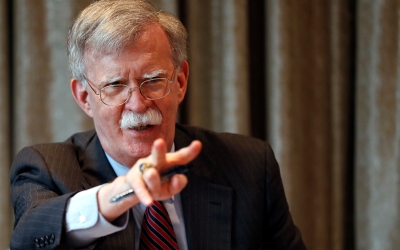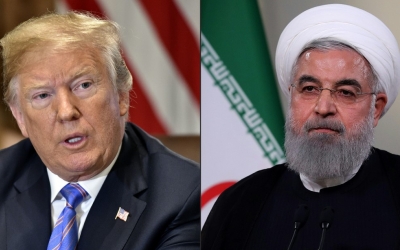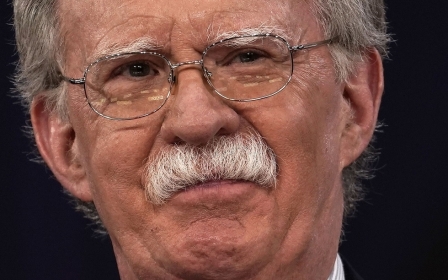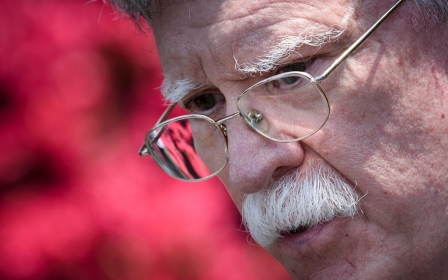'Bolton was a nightmare for us': Iranians welcome sacking as setback for 'project war'
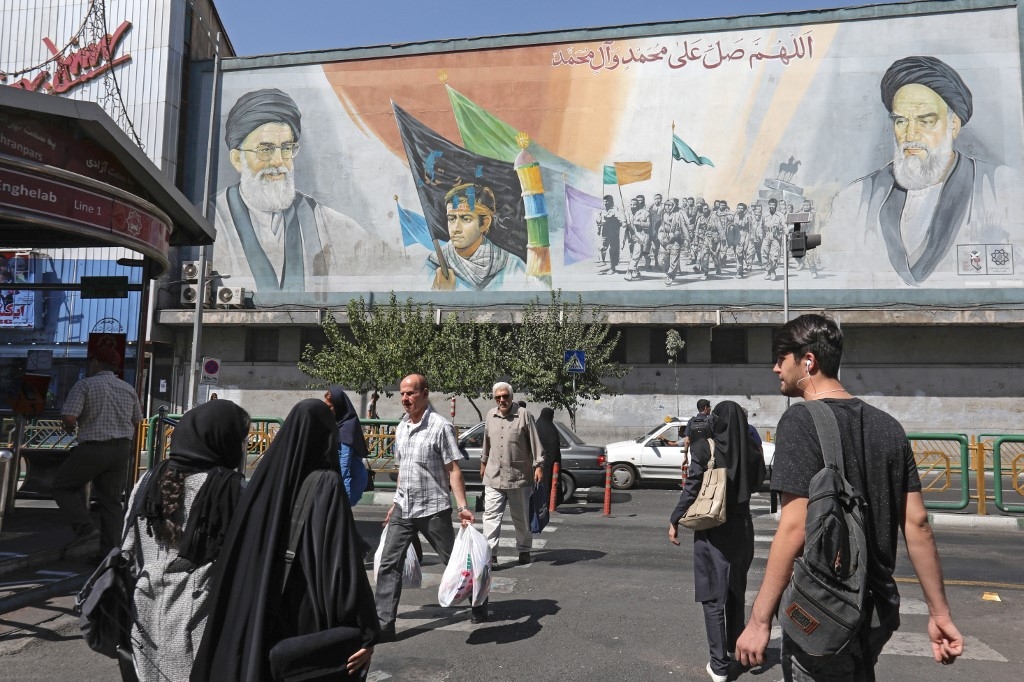
For the majority of Iranians, their reaction to John Bolton’s sudden dismissal was the same: glee.
The moustachioed US national security advisor had loomed large in the Iranian imagination, ever since pushing a hawkish line on Iran in George W Bush’s administration.
So once Farsi translations of Donald Trump’s tweet sacking Bolton began circulating, Iranians expressed a sense of relief that maybe a devastating war with the United States was suddenly far less likely.
Bardia Panahian, a cashier in a pharmacy located in Tehran’s Pasdaran Street in the north of Tehran, told Middle East Eye that “Bolton was like a nightmare for us”.
Washington, under Bolton’s encouragement, has practised a “maximum pressure” strategy to counter the Iranian government.
New MEE newsletter: Jerusalem Dispatch
Sign up to get the latest insights and analysis on Israel-Palestine, alongside Turkey Unpacked and other MEE newsletters
Since pulling out of the 2015 nuclear deal last year, it has slapped a series of crippling sanctions on Iran that have impoverished much of its population.
A series of flare-ups in the Gulf region earlier this year – including the downing of a US drone - and escalating rhetoric, often fed by Bolton himself, led many to believe that war was almost inevitable.
“While our country was starting to feel better and the economy was improving, he arrived and destroyed everything. He was like the manager of ‘project war’ and thank God he is now gone,” he said.
“I hope he pays the price of imposing such bad days to Iranians and not see a joyful day in his life.”
Payam Abadi, who works in Tehran’s Mehrabad airport as an airline employee, described Bolton’s removal as a “promising sign for the Iran-US relationship”.
“To us, Bolton was like a Hitler who planned to make the Middle East miserable by creating tensions and conflicts,” he said.
While referring to Trump’s decision as his “first right move”, Abadi also noted the similarity between the US president and Mahmoud Ahmadinejad, Iran’s notoriously anti-American former president, “who easily ousted many of his ministers and directors”.
Yes to resistance, no to negotiation
Bolton’s expulsion from the US administration turned into the top story of most Iranian news websites and newspapers, amid high hopes that negotiations between Washington and Tehran could begin.
In this vein, conservative Mashregh news noted on Wednesday that what led to Bolton’s downfall was “Iran’s deterrent resistance”, a strategy which resulted in “intercepting and downing the US drone”.
“What disintegrated Trump’s team and made their pressure futile was the strong resistance, not sending a signal for negotiation with some misguided trips to New York and Paris,” Mashregh wrote.
Moreover, reformist Etemaad newspaper called Bolton “the root of the majority of Trump’s team failures in foreign policy”.
“The principal question now is: which Bolton policy made Trump so fed up with him?” the paper asked, noting that most commentators pointed towards Iran.
Meanwhile, Ali Rabiei, the spokesperson for Iran's government, noted Bolton’s promise to the controversial MEK Iranian opposition group in 2019, where the now-redundant aide vowed to topple the Iranian government.
Iran-US rapprochement?
While Iranian analysts suggest Bolton’s sacking has distanced the shadow of war from Tehran, they aren’t optimistic such reshuffling will result in Trump changing his grand strategy regarding Iran.
“Whoever replaces Bolton won’t oppose Trump’s goal at all, and Trump’s main goal is to maximise the pressure on Tehran to reduce its ability against Israel,” Fereidoun Majlesi, who served as an Iranian diplomat in the US before the 1979 revolution, told MEE.
Majlesi noted that fresh sanctions were placed on Iran on Tuesday, indicating that Trump isn't seeking to ease the pressure.
“However, this doesn’t mean that Trump wants to trigger a war, unlike Bolton who was seriously in favour of such actions,” he said.
'Dismissing Bolton, who was hardline on Iran, isn’t equivalent to a change in US foreign policy'
- Mohammad Taghi Rahbar, former MP
Mohammad Taghi Rahbar, a conservative cleric and former MP, agreed.
“Dismissing Bolton, who was hardline on Iran, isn’t equivalent to a change in US foreign policy. Changing people in the government of the Great Satan is just a tactic and won’t alter US strategy,” he told MEE.
Similarly, Nosratollah Tajik, a reform-minded analyst and a former Iranian diplomat, said Bolton’s dismissal really had nothing to do with Iran.
“This issue was the outcome of a series of personal disagreements between Trump and Bolton over various issues. Their difference of opinion was over the tactics, not the approach and strategy,” Tajik said.
The former diplomat said Trump was loath to enter into a military conflict ahead of the 2020 US election and the president is reluctant to spend American dollars overseas.
“Trump is pursuing the idea of forcing Iranian people to rebel against the state, and this is the difference between Trump and Bolton,” he said.
“We shouldn’t be happy as Bolton isn’t just a person, he is the representative of a thought in the US political system. In fact, Bolton is gone, but Boltonism still exists.”
Trump-Rouhani meeting
There has been talk recently of a possible meeting between Trump and Iranian President Hassan Rouhani at the United Nations General Assembly later this month.
However, in the wake of Bolton’s sacking, Rouhani stood firm on his stance, telling a cabinet meeting on Wednesday: “America must understand that sticking to warmongers and war-mongering policies is no good and they must abandon warmongers and war-mongering policies and maximum pressure.”
Tajik, the former Iranian diplomat, argued that removing Bolton could be a chance for Iran-US relations to turn a new leaf and Tehran should begin outlining a new type of discourse.
“Antagonism is not useful and all the disagreements should be resolved through diplomacy,” he said.
“Although, Trump may not be the right person to begin the mentioned initiative with because his unclear goals make him an unreliable person for Iran-US talks.”
According to Majlesi, a Trump-Rouhani meeting on the sidelines of the UN General Assembly is currently “forbidden” amid the domestic pressures on Iran’s president.
The former MP Rahbar agreed. “The decisions on such issues must be taken by the state,” not just Rouhani, he said, and currently the Iranian establishment is opposed to such meeting unless “all the sanctions are lifted”.
Middle East Eye delivers independent and unrivalled coverage and analysis of the Middle East, North Africa and beyond. To learn more about republishing this content and the associated fees, please fill out this form. More about MEE can be found here.


